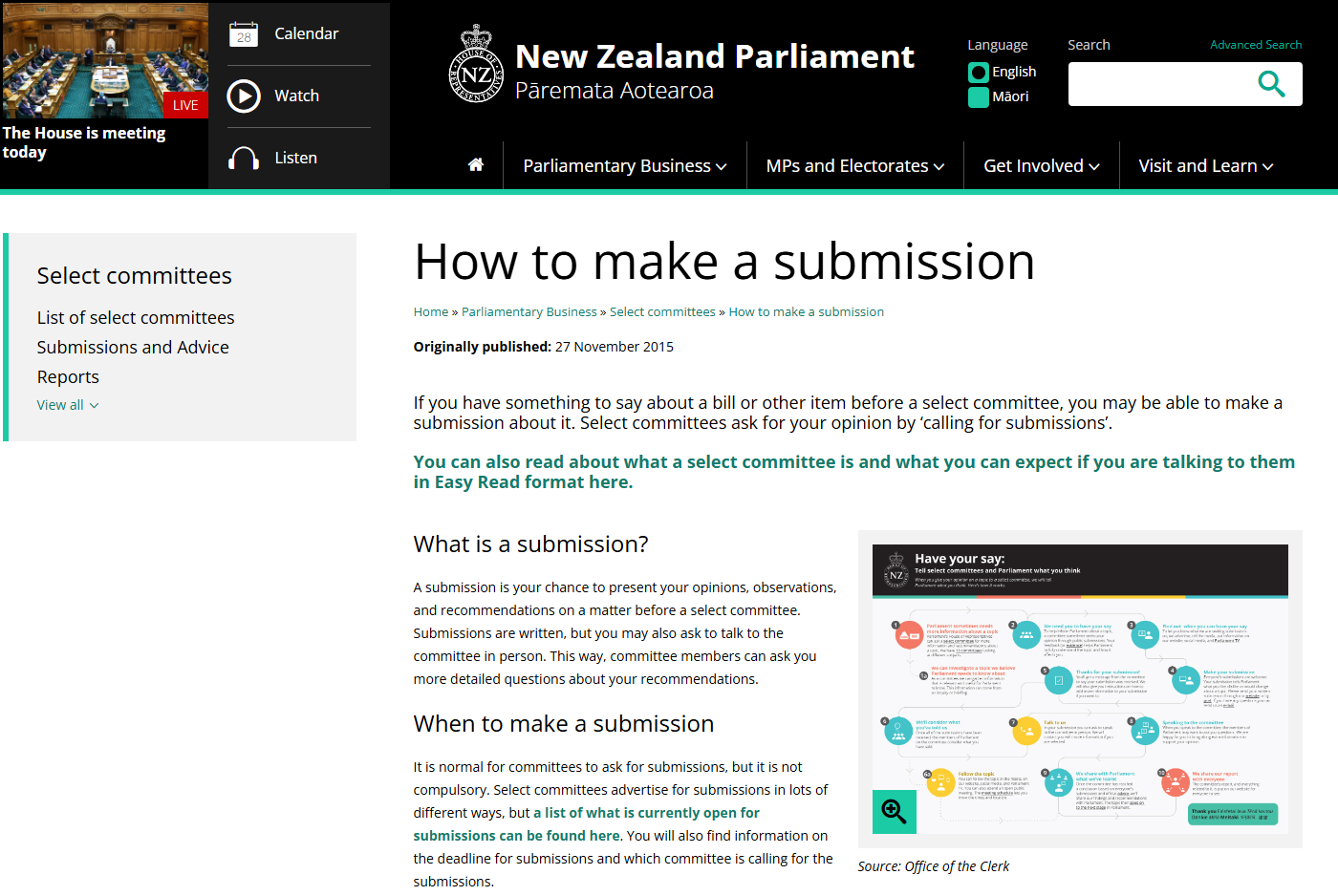Submission Impossible: How to have your say to the government
We often have strong opinions about policies and laws the government proposes. Luckily, we live in a democracy where we have the right not just to express these opinions, but for the government to listen to our views. However, making a formal submission to government can be challenging for several reasons.
We believe in the principles of subsidiarity and participation, so we’ve created this guide to help empower our community to use their voice. This comes from our own experience, including many mistakes we hope you can now learn from.
Step 1: Finding submission opportunities
How do I hear about opportunities to make a submission?
Consultations and other submission opportunities often only reach the news once people are giving oral submissions – well after the deadline for people to submit themselves. This means you need to be proactively looking for opportunities to submit.
If there is a particular issue or policy you are interested in, often you can sign up to receive email updates of any news from the responsible Ministry – for instance, we subscribe to updates from Ministry for the Environment about resource management reform.
Where can I make a submission to Parliament?
If you want to submit to a Select Committee (usually about a new piece of legislation being considered), just go to the ‘Make a Submission’ page on Parliament’s website. This lists all open and upcoming submission opportunities, and their closing dates.
Where can I make submissions to government departments?
When submitting to a different part of government, for instance a Ministry undergoing consultation on regulations, things can be a little trickier. Each Ministry and Agency has its own website, and often its own way of advertising and accepting submissions – you may need to do a bit of searching online, and make sure the page you find is the most current (e.g. the Emissions Trading Scheme is sometimes reviewed multiple times a year, so you’d want to make sure you were looking at the right page).
Step 2: Writing your submission
How do I know what to write?
If you’re writing a submission, it’s probably because you have strong feelings about a topic. Although you should aim to write formally and clearly, you don’t need to be a subject matter expert. Write from the heart and say what you think, why you care, and what the government should do. Often thousands of people will write submissions, so whoever you are writing to will remember your message rather than your wording.
In many cases, especially writing to Select Committees, your submission will eventually become publicly available – so be sure not to include private information, or anything you wouldn’t want others to see.
Should I use a template or craft my own submission?
For many major issues, such as the recent Fast-track Approvals Bill, organisations (including Caritas) put out templates to help people make submissions quickly and easily. Some people worry template submissions won’t be taken seriously.
We’ve had the chance to directly ask government officials who handle submissions how they approach them. We were told template submissions do get much less individual attention, especially if they don’t convey any unique messages – for instance, template submitters typically won’t be invited to make an oral submission if spaces are tight. However, their numbers add weight to the arguments being made, so if hundreds of people submit with the same message, that is reflected in the summary of submissions that select committees see.
Every submission is read, so when people do have the time to personalise a template submission and focus on their personal key message this can also make an impact.
Whether to use a submission template, or design your own, depends on your goal and the time you have available. If you don’t have a lot of time or confidence on a subject but want to support the existing messages you agree with, a template submission makes it much easier to do this. However, if you have strong personal message to send it may be worth taking the time to write up a unique submission (you could still include in your submission that you agree with points others have made!).
Step 3: Oral submissions
Should I make an oral submission?
When you send a written submission to a select committee, the parliament website asks if you’d also like to make an oral submission. Oral submissions typically take place a few weeks after written submissions close, and give submitters the chance to present their case in person (or via zoom) to the select committee, as well as answer questions.
Presenting directly to politicians might be daunting, and only a small minority of submitters choose to present orally (and only a certain number are scheduled due to time considerations). However, it is the strongest way to get a point across. If there is an issue you are very passionate about and confident in, oral submissions can be a great opportunity.
If you can’t travel to Parliament to present, don’t worry. Most oral submissions can also be done via Zoom. However, if you have the chance to present in person, this could help you be more compelling and connect on a human level to committee members.
How can I prepare for an oral submission?
If you are accepted to make an oral submission, make sure to confirm with the clerk of the committee (the person who emails you) all the details you need to know – such as Zoom meeting ID, the length of time you have to speak, etc.
Typically, you will have a 10- or 15-minute slot. The last five minutes of this are generally reserved for committee members to ask questions, but the remainder is your time to present. Parliament is a formal setting, and it can be intimidating, so make sure to be well prepared with what to say – but also try to speak from the heart.
Be prepared for things not to go to plan. There could be Zoom issues; someone might be sick; Parliament might be running behind or ahead of schedule. Be present (online or in person) with plenty of time beforehand and be prepared to stay late; bring all your notes with you in case you forget something or get questioned; and don’t put too much pressure on yourself to present perfectly – nerves affect everyone.
Being questioned by MPs seems like the most daunting part of submitting, but it can also be the biggest opportunity. If committee members share your position on the matter at hand, they will be looking to ask supportive questions so you can talk further on your points – this supports their own arguments, and is a great opportunity for you to get more of your point across. If committee members who disagree with you ask questions, you have a chance to explain your views and why you care.
We hope this guide will help you have your voice heard and live out the principle of participation.


